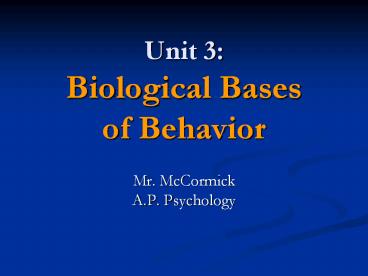Unit 3: Biological Bases of Behavior - PowerPoint PPT Presentation
1 / 14
Title:
Unit 3: Biological Bases of Behavior
Description:
Unit 3: Biological Bases of Behavior Mr. McCormick A.P. Psychology Essential Question How are human thought and behavior affected by the following: The Nervous System ... – PowerPoint PPT presentation
Number of Views:251
Avg rating:3.0/5.0
Title: Unit 3: Biological Bases of Behavior
1
Unit 3Biological Bases of Behavior
- Mr. McCormick
- A.P. Psychology
2
Essential Question
- How are human thought and behavior affected by
the following - The Nervous System
- The Endocrine System
- The Brain
- Genetics
3
Unit 3-A (A)The Neuron
- Mr. McCormick
- A.P. Psychology
4
Do-Now(Discussion)
- What is Biological Psychology?
- What parts of the body do Biological
Psychologists primarily study? - In understanding psychology, why do you think it
is important to understand biological processes?
5
Biological Psychology
- Biological Psychology
- A branch of Psychology concerned with the links
between biology and behavior - Biological Psychologists
- Behavioral Neuroscientists
- Neuropsychologists
- Behavior Geneticists
- Physiological Psychologists
- Biopsychologists
6
Biological Psychology
7
The Neuron
- Neuron
- Nerve cell
- Basic building block of the nervous system
8
The Neuron
- Types of Neurons
- Sensory Neurons
- Carry incoming information from sensory receptors
to the brain/spinal cord - E.g. Perceiving something as hot
- Motor Neurons
- Carry outgoing information from the brain/spinal
cord to the muscles/glands - E.g. Clenching a fist
- Interneurons
- Located within the brain/spinal cord
- Communicate internally between sensory inputs and
motor outputs - E.g. Reflexes
9
The Neuron
- Provide an example of information that sensory
neurons may transmit. - Provide an example of information that motor
neurons may transmit. - Provide an example of information that
interneurons may transmit.
10
Parts of the Neuron
11
The Firing of a Neuron
- Neurons transmit messages when stimulated by our
senses, or triggered by chemicals of other
neurons - Resting Potential
- Fluid interior of axon negatively charged ions
- Fluid exterior of axon membrane positively
charged ions - Threshold
- Level of stimulation required to trigger a neural
impulse (action potential) - Excitatory signals (accelerator) minus inhibitory
signals (brakes) must reach minimum intensity - Action Potential
- Neural impulse
- Depolarization occurs
- Brief electrical charge that travels down an axon
- All-or-None Response
12
The Firing of a Neuron
13
Review
- What is a neuron?
- Differentiate between the 3 types of neurons
- Sensory Neurons
- Motor Neurons
- Interneurons
- Discuss the functions of the following parts of
the neuron - Dendrites
- Axon
- Myelin Sheath
- Terminal Branches
- What causes neurons to fire?
14
Homework
- Research Study 2 More Experience Bigger
Brain (Pgs. 11-18) - Unit 3-A FRQ
- Unit 3-A Quiz The Neuron































